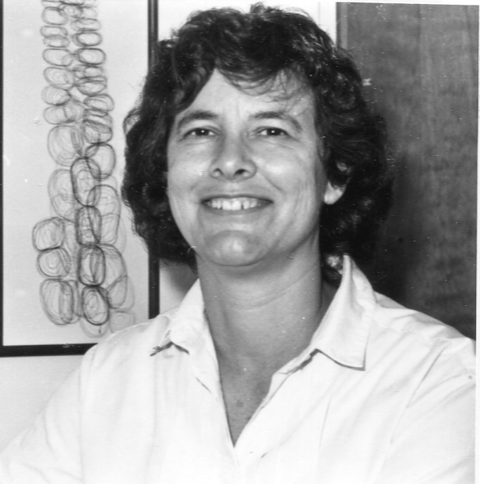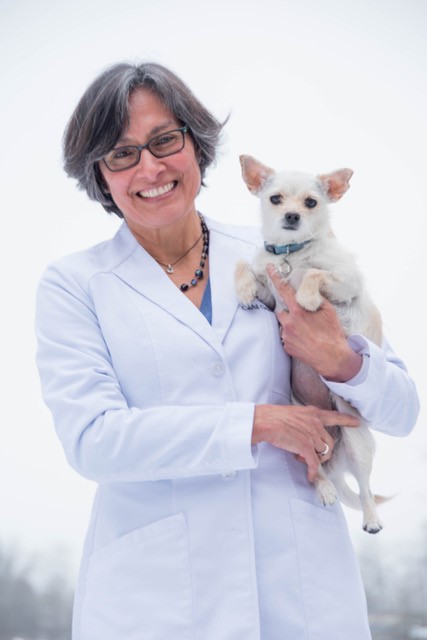A Belated Thank You
Dr. Nelly Farnum & Carol Gamez, D.V.M. ’91
Carol Gamez, D.V.M. ’91, was the first person in her family to attend college. When she began her D.V.M. program at Cornell University’s College of Veterinary Medicine, she struggled in her first-year anatomy class, taught by Dr. Cornelia Farnum. This challenge sparked an act from Farnum that would change Gamez’s life forever. In this conversation, the two women talk for the first time since their days as professor and student. You can listen to their entire conversation here.
Nellie Farnum: What are your earliest memories of me as a professor?
Carol Gamez: I remember you very well, Dr. Farnum. In my mind, you were a very powerful woman and you were the first woman veterinarian I ever met. You affected me in so many ways. Your class was quite a challenge for me. I really didn’t know how to approach anatomy or study it properly. I didn’t pass that first midterm. I was devastated.
I thought for a moment that Cornell had made a mistake, that I wasn’t going to be a veterinarian if I couldn’t pass small animal anatomy. It affected me so, and I don’t recall the exact circumstances, but you reached out to me and you said to me that it was going to be okay and that I was going to be fine and you had arranged for a tutor for me.
I found that I began to love it and I started to approach it a little bit differently. I will never forget the day that you handed out our final exam grades. In those days there were no online grades and it was a physical paper. We were all exiting the class and you were handing each one of us our graded exams.
You handed me mine and there was an A written on it. You were very reserved but you had a tiny little smile. I remember that I screamed and I reached out to you and I just gave you a huge hug. You were shocked. You didn’t expect it, and both of us laughed. Then, at that moment, I knew that I would realize my dream and become a veterinarian.
I can’t believe that it’s still so emotional after all these years, but it was you that gave me the confidence that I never had and changed me forever.
That day you changed my life, Dr. Farnum. Because of you, I’m the veterinarian I am today. That small act of yours changed me forever. You believed in me when I didn’t believe in myself.
Farnum: It’s you who’s making me teary right now. I think that’s a wonderful story.
“I remember that I screamed and I reached out to you and I just gave you a huge hug. You were shocked. You didn’t expect it, and both of us laughed.”
-Carol Gamez, D.V.M. ’91
One of the challenges we have as the professors who teach a really intense first-year class to first-year students is trying to think of where all of those students are coming from, and also it wasn’t that long since I had been a veterinary student myself. This was 1987. I graduated in 1980.
What you absolutely know is that the problem isn’t that you don’t have the capability. And the problem isn’t that you don’t have the motivation. That’s a pretty nice group of students to be teaching!
Veterinary education is like no other educational experience that I ever had in terms of — you’re in it, you really want to do well and because you think, “If I don’t do well, I won’t be a good veterinarian,” which is an odd way of thinking, but you do think that.
There are all kinds of reasons why veterinary students may have a blip when they first start. I think as a professor who always taught first-year, first-semester students, that’s something that’s always on our minds. There can be all kinds of reasons why a student may not do perfectly or as well as he or she might like on the very first exam.
I think a reason that I often tried to figure out a way to hook up a student who may not have done so well on the first exam with another student is because that’s how I got through veterinary school myself. It’s one of the reasons we hire veterinary students to make so many of our teaching materials, because sometimes veterinary students are just plain better at understanding what it is that is causing another student to have some difficulty.
Gamez: I know you’ve retired from teaching, but what were some of your biggest challenges that you dealt with in your career as a veterinary professor?

Farnum: I can tell you the things that made me nervous. You were in the second class that I ever taught at Cornell. I had been hired by Dr. Howard Evans to teach the course that he had taught for 40 years or more, for which he also wrote the book and also wrote the dissection manual. He retired right after he hired me, but he liked to come and listen to my lectures.
Now, if that doesn’t make you nervous, Howard Evans was a legend. I knew I was teaching this differently than he had been teaching it for a whole variety of reasons. We just have different approaches, different teaching styles. That certainly made me nervous.
The other thing was, I was, fortunate to be teaching with some very charismatic colleagues in the Department of Anatomy. One was John Cummings. Then, of course, one was Sandy de Lahunta. He was co-teaching with me. That’s humbling and was certainly a challenge. It’s something that I still think about today. I later became his department chair, so I even would hold yearly reviews and ask him how he was doing, which always seemed a bit of a flip-flop.
I would say that a challenge especially in the beginning was just even thinking of teaching in a place like Cornell which had such a legacy of outstanding anatomy teachers who, as I said, also wrote all the textbooks that we used.
Gamez: What are the most important lessons you’ve learned in your career?
Farnum: I think a person is really fortunate if you end up in a job that you really like and is a good match for you. That was certainly true for me. Ask any professor who’s at a university that is supportive of their research and their academic scholarship, and that’s a huge motivator and makes you happy to be at work every day.
Then, second, is the real privilege that we in the veterinary college have of teaching incredible, highly motivated, very bright students. If the worst problem you have is that they get anxious because they’re worried that they personally aren’t as good as you think they are, that’s not a bad challenge to be facing all the time.
I think what I’ve learned is that I was lucky to end up at a place where both of those things were very supportive for me.
But if I reverse that question and ask you, what do you think are the most important lessons you’ve learned so far in your career?
Gamez: For me, being a veterinarian has just been the most rewarding career. To this day I day enjoy going to work. I have a wonderful little practice in Georgetown, Connecticut. I have a Cornellian partner. I’ve just enjoyed doing what I’ve always dreamed of doing and I’m still happy and I still feel joy and excitement when I’m sending home patients.
Cornell gave me that gift. I will always be grateful to Cornell for believing in me and making this a realization for me.

Farnum: What I found so interesting about becoming a professor in the mid-’80s was that at least half the class if not more were women, and that’s so different from when I went to veterinary school.
I went to veterinary school right after Title IX had been passed and, although our class had a third women, it was one of the first classes admitted without any restrictions on the basis of gender. It was still pretty unusual to be going to veterinary school.
To compare our two experiences, when I was growing up in the ’50s, I never even put it in my mind that I could be a veterinarian. I never knew a woman who was a veterinarian. I used to help my mother fix the abscesses on our tomcats and things like that, but the idea that I could be a veterinarian just never crossed my mind. As you may know, I never even went to veterinary school till 12 years after I graduated from college.
It’s kind of neat that we both ended up in a profession we really like, having gotten there so differently.
And now you are a part of the President’s Council of Cornell Women (PCCW)?
Gamez: I am.
Farnum: That’s a real honor. How do you view that responsibility?
Gamez: This will be my second year as a member of the PCCW. I decided that one of my goals as a new member would be to mentor. I thought that even more I should mentor students like myself.
We this year have created the PCCW first-generation mentor subcommittee. Our goal is to find young women, first-generation young women, who are seeking mentors — somebody other than family members or friends, somebody who is a professional in various fields, not necessarily veterinary medicine. I just happen to be a veterinarian.
These are young students with varied interests, and so the PCCW has matched women of various industries to Cornell students. It’s been very rewarding for me to see that we were able to place 10 students with 10 mentors. We’re hoping to increase that number next year and the years to come.
Farnum: That’s a very good idea, a very nice idea.
What advice would you give yourself as a student, knowing what you know now?
Gamez: I would tell myself to believe in yourself and to seek out a mentor proactively. I didn’t realize that that was an option at the time, and so I did a lot of things alone.
I’d also tell myself that you’re not alone in your struggles and that your professors are just regular people and they really care — and that small acts of kindness matter.
You did something for me, Dr. Farnum, 32 years ago, and you never knew it. I never had the chance to tell you this story and I never had a chance to say thank you until now. I want to say thank you, Dr. Farnum, for what you did for me so many years ago.
I’m forever grateful and I will never forget you. I believe that I’m the veterinarian I am today because of that small act of kindness.
Farnum: Thank you. From now on, it’s Carol and Nelly, right?
Gamez: Yes. It will be.


